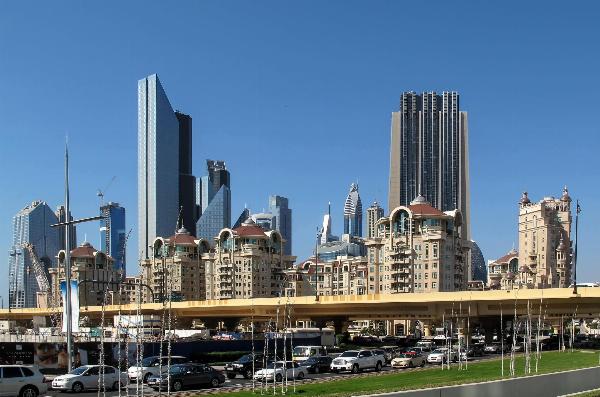 Get SEO-Optimized Articles – Written for Humans, Loved by Google!
Get SEO-Optimized Articles – Written for Humans, Loved by Google!
Establish businesses in Dubai or UAE
Written by zhcounsultancy » Updated on: June 17th, 2025

Introduction
Dubai, one of the seven emirates of the United Arab Emirates (UAE), has emerged as a global business hub over the past few decades. The city's strategic location between Europe, Asia, and Africa, coupled with its state-of-the-art infrastructure, world-class facilities, and business-friendly environment, has made it a magnet for entrepreneurs and multinational companies alike. This essay explores the various aspects of establishing a business in Dubai, including the legal framework, types of business structures, economic zones, and the benefits and challenges of doing business in this vibrant city.
1. The Legal Framework for Business in Dubai
Dubai offers a robust legal framework that facilitates business operations for both local and international entrepreneurs. The UAE, of which Dubai is a part, has implemented a series of laws and regulations that govern business activities, ensuring transparency, fairness, and protection of investors' rights.
1.1 Business Licensing
To operate a business in Dubai, obtaining the appropriate license is mandatory. The Department of Economic Development (DED) in Dubai is the primary authority responsible for issuing business licenses. The type of license required depends on the nature of the business activity:
Commercial License: For businesses engaged in trading activities.
Industrial License: For businesses involved in manufacturing or industrial activities.
Professional License: For service-oriented businesses such as consultancy firms, educational institutions, and healthcare providers.
1.2 Legal Structures
Businesses in Dubai can choose from several legal structures, each offering different levels of liability, ownership, and control:
Sole Proprietorship: Owned and operated by a single individual. The owner has unlimited liability, meaning personal assets may be used to cover business debts.
Limited Liability Company (LLC): The most common form of business in Dubai, where the liability of shareholders is limited to their shares in the company. An LLC requires a minimum of two and a maximum of fifty shareholders.
Branch Office: A foreign company can establish a branch office in Dubai to conduct business. The branch is not a separate legal entity but an extension of the parent company.
Free Zone Company: Businesses can be set up in one of Dubai's many free zones, which offer 100% foreign ownership, tax exemptions, and simplified regulations.
2. Free Zones in Dubai
Dubai is home to more than 30 free zones, each catering to specific industries and offering unique benefits. Free zones are special economic areas designed to attract foreign investment by providing incentives such as full foreign ownership, zero customs duties, and tax exemptions.
2.1 Jebel Ali Free Zone (JAFZA)
Established in 1985, JAFZA is one of the oldest and largest free zones in Dubai. It is strategically located near the Jebel Ali Port, the world's largest man-made harbor, making it an ideal location for logistics and manufacturing companies. JAFZA offers a wide range of facilities, including warehouses, offices, and industrial plots, catering to various business needs.
2.2 Dubai Multi Commodities Centre (DMCC)
The DMCC is a leading free zone dedicated to the trading of commodities such as gold, diamonds, tea, and oil. Established in 2002, DMCC has grown to become the world's most interconnected free zone, with over 18,000 registered companies. It offers state-of-the-art infrastructure, flexible office solutions, and access to global markets.
2.3 Dubai Internet City (DIC)
DIC is the largest technology hub in the Middle East, designed to support the growth of the information and communication technology (ICT) sector. It houses major global tech companies, including Microsoft, Google, and IBM, as well as a thriving startup ecosystem. Businesses in DIC benefit from modern infrastructure, networking opportunities, and a vibrant community of like-minded professionals.
2.4 Dubai International Financial Centre (DIFC)
DIFC is a leading financial hub in the Middle East, Africa, and South Asia (MEASA) region. It is home to over 2,500 companies, including banks, insurance firms, and legal and consulting practices. DIFC operates under an independent legal system based on English common law, providing a secure and transparent environment for financial transactions.
3. The Benefits of Establishing a Business in Dubai
Dubai offers numerous advantages that make it an attractive destination for business establishment:
3.1 Strategic Location
Dubai's geographical location at the crossroads of Europe, Asia, and Africa makes it an ideal gateway to key markets. The city's well-developed logistics infrastructure, including world-class airports and seaports, ensures seamless connectivity and efficient trade routes.
3.2 Tax Incentives
One of the most significant advantages of doing business in Dubai is its favorable tax regime. There is no personal income tax, and corporate tax is limited to certain industries, such as oil and gas and banking. Businesses operating in free zones enjoy complete tax exemptions, including 100% repatriation of profits and capital.
3.3 Ease of Doing Business
Dubai consistently ranks high in global ease of doing business indices. The city offers streamlined procedures for business registration, licensing, and visa processing. The government has also implemented various online platforms and smart services to simplify administrative tasks and reduce bureaucratic hurdles.
3.4 World-Class Infrastructure
Dubai boasts state-of-the-art infrastructure, including modern office spaces, advanced telecommunications networks, and reliable utilities. The city's transportation network is well-developed, with extensive roadways, metro lines, and air and sea connections, facilitating smooth business operations.
3.5 Access to Skilled Workforce
Dubai's diverse and multicultural environment attracts talent from around the world. The city offers access to a skilled workforce with expertise in various industries, including finance, technology, healthcare, and hospitality. The UAE government also provides visa options that cater to different categories of workers, from professionals to blue-collar employees.
3.6 Quality of Life
Dubai offers a high standard of living, making it an attractive destination for expatriates and their families. The city is known for its safe and secure environment, world-class healthcare and education systems, and a wide range of leisure and entertainment options. The cosmopolitan lifestyle, with a rich blend of cultures and cuisines, adds to Dubai's appeal.
4. Challenges of Doing Business in Dubai
While Dubai presents numerous opportunities, there are also challenges that businesses may face when establishing operations in the city:
4.1 Cultural Differences
Dubai is a melting pot of cultures, and understanding local customs and business etiquette is essential for success. While English is widely spoken, Arabic remains the official language, and certain business practices may differ from Western norms. Building relationships and establishing trust are critical components of doing business in Dubai.
4.2 Regulatory Environment
Although Dubai offers a business-friendly environment, navigating the regulatory landscape can be complex, especially for new entrants. Compliance with local laws, obtaining necessary permits, and adhering to labor regulations require careful attention. Businesses must stay informed about changes in regulations to avoid potential legal issues.
4.3 Cost of Living and Business Operations
Dubai is known for its high cost of living, which can impact both expatriates and businesses. Office rents, utilities, and employee salaries can be expensive, particularly in prime locations. Additionally, the cost of obtaining business licenses and permits may vary depending on the type of business and the location.
4.4 Competition
As a global business hub, Dubai attracts companies from around the world, leading to intense competition in various sectors. Businesses must differentiate themselves through innovation, quality, and customer service to thrive in this competitive market. Staying ahead of industry trends and continuously adapting to market demands is crucial for long-term success.
5. Steps to Establish a Business in Dubai
Establishing a business in Dubai involves several key steps, which can vary depending on the chosen business structure and location. The following is a general overview of the process:
5.1 Choose the Business Activity
The first step is to decide on the type of business activity you wish to pursue. This will determine the type of license you need and the legal structure of your business. It is essential to research the market demand and competition in your chosen industry.
5.2 Select the Legal Structure
Next, choose the legal structure that best suits your business needs. Whether you opt for an LLC, branch office, or free zone company, each structure has its own set of requirements and benefits. It is advisable to consult with a legal expert or business consultant to make an informed decision.
5.3 Choose a Business Location
Selecting the right location is critical to the success of your business. You can choose to operate in mainland Dubai or within a free zone, depending on your business activity and ownership preferences. Each option has its own advantages, such as access to local markets or benefits of free zone incentives.
5.4 Reserve a Trade Name
Once you have decided on the business activity, legal structure, and location, you need to reserve a trade name for your business. The trade name must comply with the UAE's naming conventions and should not conflict with existing businesses.
5.5 Apply for Initial Approval
The next step is to apply for initial approval from the DED or the relevant free zone authority. This approval indicates that the government has no objection to your business activity. You may also need to obtain additional approvals from other regulatory bodies, depending on the nature of your business.
5.6 Draft a Memorandum of Association (MOA)
For businesses such as LLCs, drafting a Memorandum of Association (MOA) is required. The MOA outlines the ownership structure, capital distribution, and management responsibilities of the business. It must be signed by all shareholders and notarized.
5.7 Lease an Office Space
To obtain a business license, you must have a physical office space in Dubai. Depending on your chosen location, you can lease office space in a commercial building, business center, or free zone. The lease agreement is a prerequisite for the final licensing process.
5.8 Submit Documents and Obtain License
After completing the above steps, you need to submit the required documents to the DED or free zone authority. These documents typically include the MOA, lease agreement, trade name reservation, and initial approval. Upon successful submission, you will receive your business license, allowing you to legally operate in Dubai.
5.9 Open a Corporate Bank Account
Once you have obtained your business license, you can open a corporate bank account in Dubai. This is essential for conducting financial transactions and managing your business operations. Dubai's banking sector is well-developed, offering a range of services to meet the needs of businesses.
6. Conclusion
Establishing a business in Dubai offers a wealth of opportunities for entrepreneurs and multinational companies looking to tap into the Middle East's dynamic markets. With its strategic location, business-friendly environment, and world-class infrastructure, Dubai has positioned itself as a global business hub. However, success in Dubai requires a thorough understanding of the legal framework, careful planning, and the ability to navigate cultural and regulatory challenges. By following the proper steps and leveraging the city's unique advantages, businesses can thrive and contribute to Dubai's continued growth and prosperity.
Note: IndiBlogHub features both user-submitted and editorial content. We do not verify third-party contributions. Read our Disclaimer and Privacy Policyfor details.
Copyright © 2019-2025 IndiBlogHub.com. All rights reserved. Hosted on DigitalOcean for fast, reliable performance.









